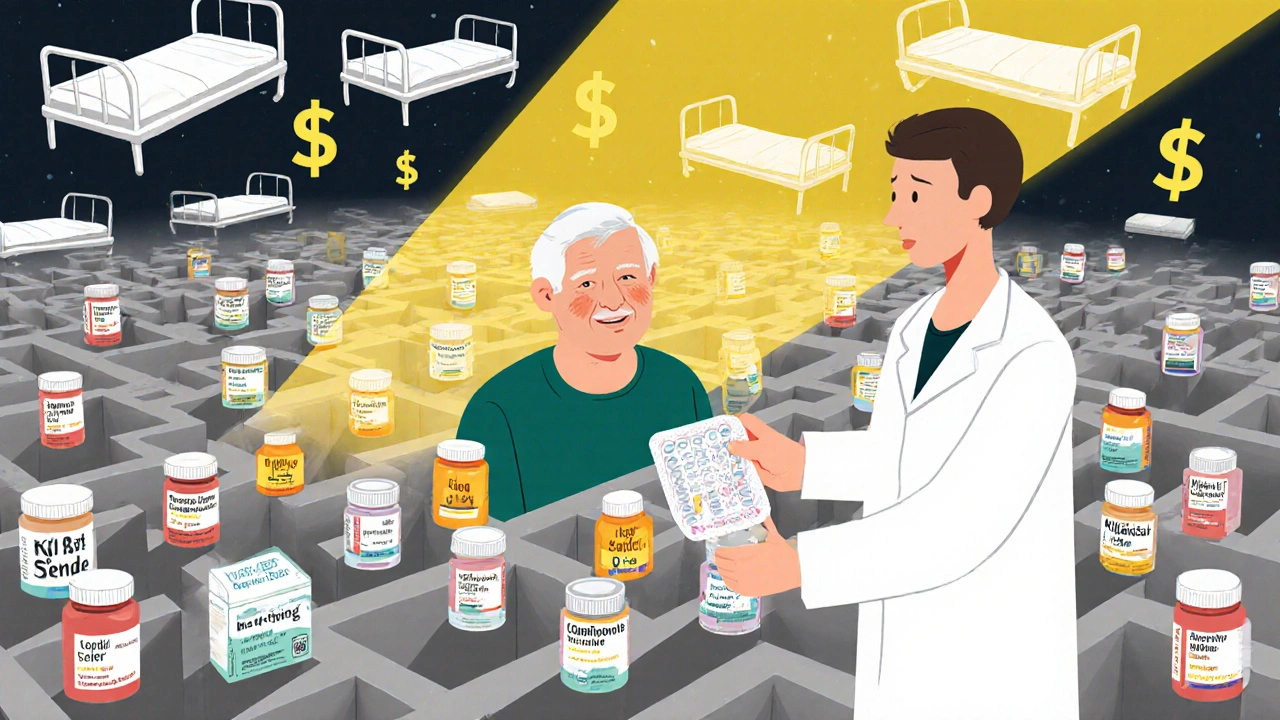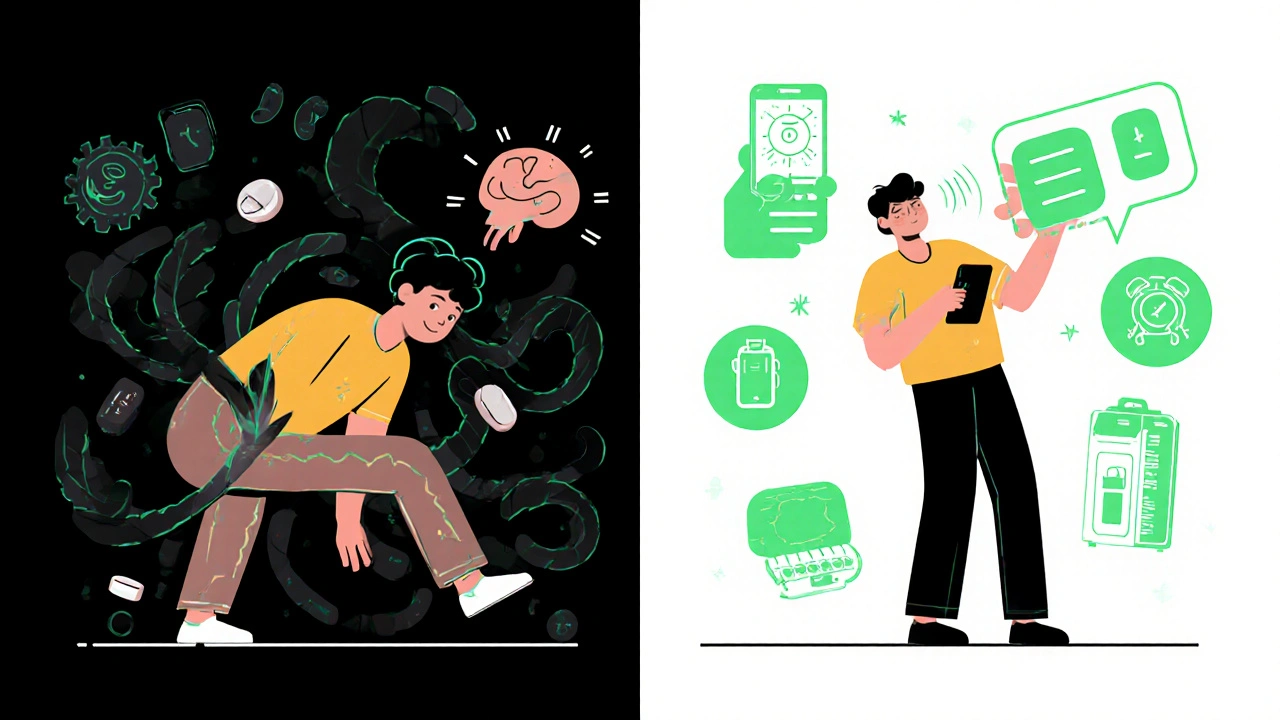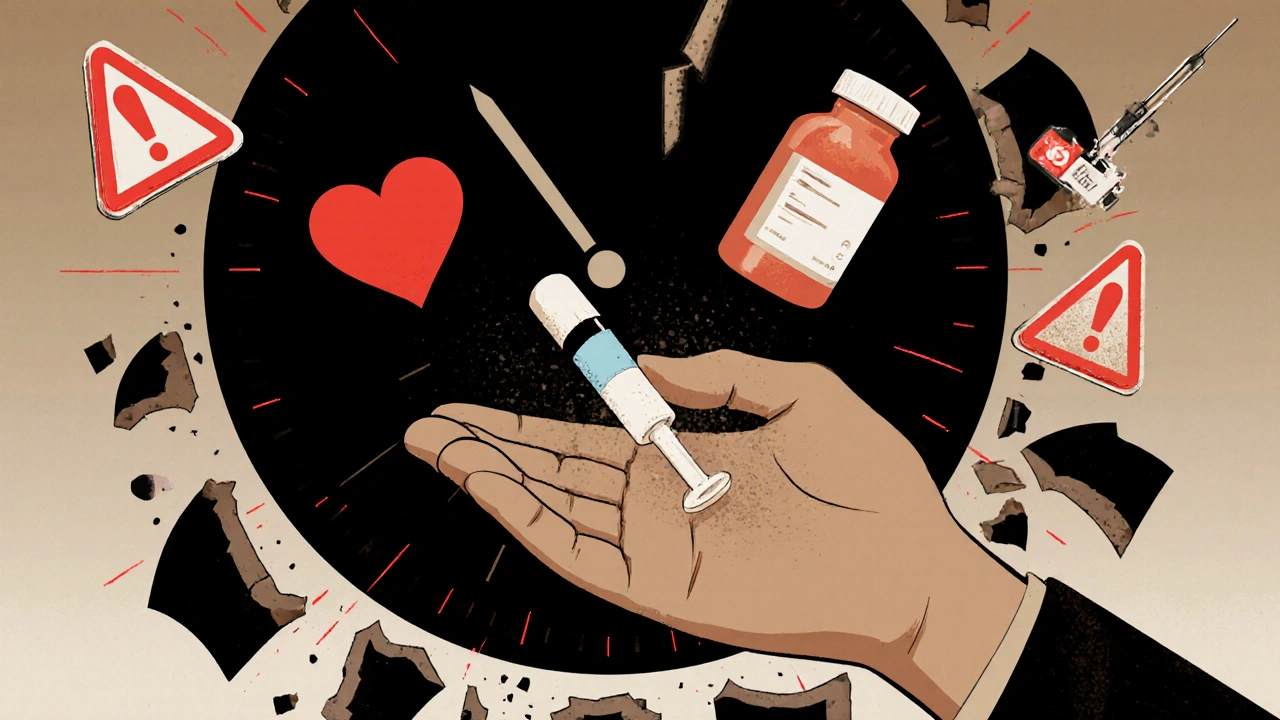Skipping a pill here and there might seem harmless. Maybe you forgot. Maybe you felt better. Maybe the cost was too high. But if you're not taking your medication exactly as your doctor ordered, you're not just being careless-you're putting your life at risk.
Every Missed Dose Adds Up
Doctors don’t prescribe medications randomly. Every dose, every timing, every schedule is calculated to keep you alive or stable. When you skip doses, delay refills, or stop early, you break that balance. For chronic conditions like high blood pressure, diabetes, or heart failure, even small lapses can trigger serious problems. A single missed dose of blood pressure medicine might not make you feel different-but over weeks, it raises your chance of stroke or heart attack. The same goes for antibiotics: stopping early doesn’t just make the infection come back-it can create superbugs that no drug can kill.
Studies show that about half of people with long-term illnesses don’t take their meds as directed. That’s not a small group. That’s millions. And the results aren’t theoretical. In the U.S. alone, an estimated 125,000 people die each year because they didn’t take their medications properly. That’s more than deaths from car accidents or homicide. For people over 50, the risk is even worse-nonadherence is 30 times more likely to kill you than being murdered.
It’s Not Just About Death-It’s About Hospital Trips
If you think the worst outcome is death, think again. More common-and just as devastating-are hospital visits. About 20% of Medicare patients who get readmitted within 30 days are sent back because they didn’t follow their drug plan. Half of those readmissions are directly tied to skipping pills. That’s not bad luck. That’s preventable.
People with asthma or COPD who skip inhalers end up in the ER. Those with mental health conditions like depression or bipolar disorder who stop their meds are far more likely to have crises that require emergency care. One study found that 59% of people with mental illness inconsistently take or completely skip their prescribed medications. That’s not laziness. That’s a system failure.
And it’s expensive. Each avoidable hospitalization costs thousands. In 2016, nonadherence cost the U.S. healthcare system $529 billion. That’s not a typo. Half a trillion dollars. That money could pay for doctors, clinics, and better drugs for everyone.
Why Do People Skip Their Meds?
It’s easy to blame patients. But the real reasons are deeper-and more systemic.
Cost is the biggest barrier. In 2021, 8.2% of working-age adults said they didn’t take their medication because they couldn’t afford it. That number is rising. Out-of-pocket drug costs jumped 4.8% that year alone. People are choosing between insulin and groceries. Between heart pills and rent.
Complex regimens kill adherence. If you’re taking eight different pills at five different times a day, it’s no surprise you mess up. Older adults often have five or more prescriptions. Mixing up pills, forgetting which one does what, or being overwhelmed by side effects leads to quitting.
Fear of side effects is another major reason. People stop their cholesterol meds because they heard about muscle pain. They skip antidepressants because they’re scared of weight gain. But they don’t talk to their doctor about it. They just quit.
Communication gaps play a big role too. Many patients don’t understand why their meds matter. They’re given a script and told to “take one daily,” but no one explains what happens if they don’t. No one checks in. No one asks if it’s working-or if it’s too expensive.
And for Black, Latino, and other minority communities, distrust in the medical system, lack of nearby pharmacies, and language barriers make adherence even harder. These aren’t personal failures-they’re systemic injustices.

What Happens When You Stop Too Soon?
Some people stop taking meds because they feel better. That’s a trap.
High blood pressure doesn’t cause symptoms until it’s too late. Cholesterol doesn’t make you feel sluggish until your artery is 80% blocked. Thyroid meds? You won’t notice the difference until you’re exhausted, gaining weight, or depressed. Stopping because you “feel fine” is like turning off your smoke alarm because the kitchen isn’t on fire right now.
For transplant patients, missing even one dose of anti-rejection drugs can cause organ failure. For epilepsy, skipping a dose can trigger a seizure. For HIV, inconsistent use leads to drug resistance-making the virus untreatable. These aren’t hypotheticals. These are real outcomes happening every day.
There Are Solutions-But They’re Not Being Used
It’s not all doom and gloom. We know what works.
Pharmacists who check in with patients? They improve adherence by 15-20%. Text message reminders? They boost compliance by 12-18%. Simplified pill schedules? One pill instead of five? That helps. Packaging meds in daily blister packs? That cuts confusion.
Medication therapy management programs-where a pharmacist reviews all your drugs and talks to your doctor-save money. For every dollar spent on these programs, the system saves $3 to $10 in avoided hospital visits.
So why aren’t we doing more of this? Because insurance companies don’t pay for it. Most doctors don’t have time. Pharmacies are overwhelmed. There’s no incentive to help you stay healthy-only to sell you the next pill.
And new tech is coming. AI tools can now predict who’s likely to miss doses with 70-85% accuracy. That means we can reach people before they crash. But without funding and policy changes, these tools stay locked in labs.

What You Can Do Right Now
You don’t need a perfect system to stay on track. Start with these steps:
- Ask your doctor: “What happens if I miss a dose?” Write down the answer.
- Use a pill organizer. Even a cheap one from the drugstore helps.
- Set phone alarms for every dose. Label them: “Blood pressure,” “Diabetes,” “Antibiotic.”
- If you can’t afford your meds, tell your doctor. There are patient assistance programs, coupons, or cheaper generics you might not know about.
- Don’t stop meds because you feel better. Always check first.
- Bring all your pills-bottles and all-to every appointment. Your doctor needs to see what you’re actually taking.
Medication adherence isn’t about discipline. It’s about support. If your system isn’t helping you stay on track, speak up. Ask for help. Demand better.
It’s Not Just Your Health-It’s Everyone’s
When you skip your meds, you don’t just hurt yourself. You add to the cost of care for everyone. More hospital visits mean higher insurance premiums. More ER trips mean longer waits for others. More drug resistance means fewer effective treatments for future patients.
Taking your medicine isn’t a chore. It’s a lifeline. And when millions of people skip it, the whole system suffers.
You’re not alone. Millions struggle with this. But you have more power than you think. Ask questions. Get help. Stick to the plan. Your life depends on it.
What happens if I miss one dose of my medication?
Missing one dose usually won’t cause immediate harm, but it can reduce the effectiveness of your treatment. For some medications-like antibiotics, blood thinners, or HIV drugs-even one missed dose can lead to resistance or a flare-up. Always check your medication’s instructions or call your pharmacist. Never double up unless told to.
Why do people stop taking their prescribed medications?
The top reasons are cost, side effects, complexity of the regimen, and not understanding why the drug matters. Many patients feel better and assume they no longer need the medicine. Others are scared of long-term side effects or don’t know how to manage them. Lack of follow-up from providers makes it worse.
Can skipping meds really cause death?
Yes. In the U.S., about 125,000 deaths each year are linked to not taking medications as prescribed. For people over 50, the risk is 30 times higher than homicide. Conditions like heart disease, diabetes, and high blood pressure can spiral out of control without consistent treatment, leading to heart attacks, strokes, kidney failure, or organ rejection.
How can I afford my medications if they’re too expensive?
Talk to your doctor or pharmacist. Ask about generic versions, patient assistance programs from drug manufacturers, or discount cards like GoodRx. Some pharmacies offer $4 generic lists. Medicare Part D has a cap on out-of-pocket costs. Never skip doses because of cost-there are always options if you ask.
Are there tools to help me remember to take my pills?
Yes. Pill organizers, phone alarms, and medication reminder apps are proven to help. Some pharmacies offer blister packs with days of the week labeled. Text message reminders from your provider’s office can improve adherence by up to 18%. Simple tools make a big difference.
Is medication nonadherence more common in older adults?
Yes. Older adults often take multiple medications for several conditions, making it harder to keep track. Up to 100,000 preventable deaths each year happen in elderly patients due to nonadherence. Cognitive decline, vision problems, and confusion over pill schedules contribute. Simplifying regimens and using daily pill boxes can help significantly.
Can my pharmacist help me with adherence?
Absolutely. Pharmacists can review all your medications, spot interactions, simplify your schedule, and help you find cost-saving options. Many offer free medication therapy management (MTM) services. Ask if your pharmacy provides this-it’s often covered by insurance and can reduce hospital visits.
What should I do if I’m having side effects?
Don’t stop the medication on your own. Call your doctor. Many side effects are temporary or can be managed with dosage changes, timing adjustments, or added medications. Stopping abruptly can be dangerous. Your doctor needs to know what you’re experiencing to help you safely.


Comments
Kane Ren
Hey, I get it - life gets crazy. I missed my blood pressure pills for three days last month because I was working double shifts and forgot to refill. But I called my pharmacist the next day, and they mailed me a free 30-day supply through a patient program. It’s not about being perfect - it’s about reaching out. You’re not alone in this.
Small steps matter. A pill organizer? Yes. Alarms? Absolutely. But also - talk to someone. Your doc, your pharmacist, even a friend. We’ve all been there.
November 22, 2025 at 01:27
Charmaine Barcelon
You people are so irresponsible!!! You skip your meds because you’re lazy!! You think the system owes you? NO!! It’s your LIFE!! You don’t get to just quit because it’s ‘too expensive’ or ‘you feel fine’-that’s not a reason, that’s a death sentence!! I’ve seen it happen-my uncle died because he stopped his statins because he ‘didn’t like the side effects.’ STOP MAKING EXCUSES!!
November 22, 2025 at 13:54
Karla Morales
Let’s analyze the data: 125,000 U.S. deaths annually due to nonadherence. That’s 342 deaths per day. 📉
Compare that to motor vehicle fatalities: ~42,000/year. 🚗💥
So… medication noncompliance is 3x deadlier than car crashes. 🧠📉
And yet - no public service campaigns. No celebrity PSAs. No viral TikTok trends. Why? Because pharma doesn’t profit from adherence - they profit from repeat prescriptions. 💸
Also - 8.2% of working adults skip meds due to cost? That’s not ‘poor choices.’ That’s systemic collapse. 🏛️
And yes - I’m using emojis because this is emotionally devastating. 😢💊
November 22, 2025 at 15:07
Richard Wöhrl
Just wanted to add something important: if you’re on multiple meds, especially for chronic conditions, ask your doctor about a MedsCheck or Medication Therapy Management (MTM). It’s free through most insurance plans - a pharmacist sits down with you, reviews every pill, checks for interactions, simplifies your schedule, and even helps you find discounts.
I helped my mom do this last year - she was taking 11 pills a day, at 5 different times. The pharmacist condensed it to 4 pills, once a day. She hasn’t been to the ER since.
Also - if you’re scared of side effects, don’t Google it. Talk to your pharmacist. They’ve seen it all. They won’t judge. They just want you to live.
And yes - cost is a nightmare. But there are always options. Always. Just ask.
You’re not weak for struggling. You’re human. And there are people who want to help.
Don’t suffer in silence.
November 23, 2025 at 06:35
Pramod Kumar
Bro, I’m from India, and I’ve seen this play out in villages where people stop diabetes meds because they ‘feel normal’ after a week - then end up with foot ulcers. No one tells them why the pills matter. No one checks in.
But here’s the thing - in my community, we’ve started WhatsApp groups. One person takes their meds, posts a pic of their pill organizer. Others join. It’s not about shame. It’s about seeing someone else doing it - and thinking, ‘Hey, I can too.’
It’s not just about pills. It’s about belonging.
And yeah - cost? We share generics. We split bottles. We call pharma reps together. We’re not perfect. But we’re trying.
You’re not broken. You’re just stuck in a system that forgot to hold your hand.
November 24, 2025 at 09:55
Brandy Walley
lol who even cares if you miss a pill? You think your body’s that fragile? I stopped my antidepressants cold turkey and I’m fine. I felt better. The system is just trying to keep you hooked on drugs. Doctors don’t know anything. They’re just profit machines. Your life is yours. Take what you want. Screw the rules.
Also why do people even need 8 pills a day? That’s just laziness. Eat less sugar. Move more. Stop being a victim.
November 25, 2025 at 05:00
shreyas yashas
My dad’s 72. Takes 6 meds. Can’t read the tiny labels. Got confused between his blood thinner and his thyroid pill. Almost ended up in the hospital.
So we got him one of those weekly pill boxes. Labeled everything in big letters. Set up phone alarms with his grandkid’s voice saying, ‘Hey Baba, time for your heart pill.’
He cries now when he takes them. Not because he’s sad. Because he feels seen.
It’s not about discipline. It’s about love.
And yeah - the system sucks. But we can still love each other through it.
November 25, 2025 at 11:52
Suresh Ramaiyan
There’s a quiet kind of courage in taking your meds every day - especially when no one sees it. No applause. No trophies. Just you, a pill, and the silent promise to yourself that you’re worth the effort.
But we’ve turned health into a moral test. ‘If you’re sick, you failed.’ No. You’re just human in a broken system.
What if we stopped blaming and started building? What if pharmacies had counselors? What if your doctor asked, ‘How’s your wallet doing?’ instead of just ‘Are you taking your pills?’
Maybe healing isn’t about willpower. Maybe it’s about dignity.
We owe each other that.
November 26, 2025 at 08:16
Katy Bell
I used to skip my anxiety meds because I hated how they made me feel ‘numb.’ Then I had a panic attack in the grocery store and couldn’t breathe. I cried in the cereal aisle. No one helped.
So I wrote a letter to my doctor. Not angry. Just honest. ‘I need help. I’m scared.’
She changed my med. Lowered the dose. Gave me a free sample. Told me to call anytime.
It’s not about being strong. It’s about being brave enough to say, ‘I need help.’
And if you’re reading this and you’re struggling? You’re not weak. You’re surviving.
I see you. 💙
November 26, 2025 at 13:13